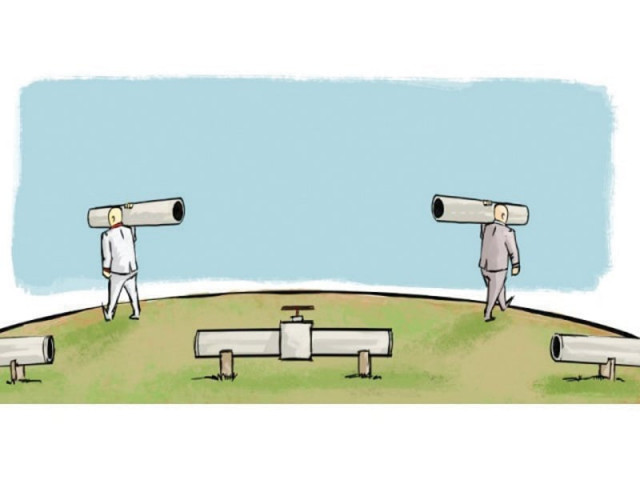Gas problems : UFG benchmark should go up, says SSGC MD
Panel of experts believe even 7% not enough to compensate gas utilities.

Gas problems : UFG benchmark should go up, says SSGC MD
Without saying exactly how much, he said a panel of experts had earlier estimated that the UFG benchmark at even 7% was not enough to fairly compensate the two gas utilities.
“I don’t want to be drawn into this discussion on UFG because that is something for the government to decide,” he said. “But the fact remains that the challenges in Pakistan are far different from what companies face internationally.”
The UFG issue has become a major thorn in how the SSGC and Sui Northern Gas Pipelines Limited (SNGPL) function as the regulator and government remain at loggerheads about its revision.
The revenue and expenditure of both companies is regulated by Oil and Gas Regulatory Authority (Ogra), which decides how much gas is allowed to be ‘lost’ from pipelines. Currently, that benchmark is fixed at around 4%.
The cost of any loss over the 4% limit is not allowed to be made part of the revenue and the companies have to book it as a loss. The UFG loss of SSGC stands at 10%.
Last week, Federal Petroleum Minister Shahid Khaqan Abbasi said that Ogra was too scared to set a higher UFG benchmark due to the fear of being prosecuted by the courts, but not doing so could cost taxpayers billions of rupees, he said.
Ministry of Petroleum and Natural Resources will move a summary after Eid for the Economic Coordination Committee’s (ECC) approval to find a permanent solution for the problem.
Warsi, who took over as the acting MD last week, said that gas theft and pipeline ruptures cause most of the losses. “Eighty percent of the entire supply is lost in the Quetta region,” he said.
In smaller towns and even cities, people in instances puncture holes in SSGC steel pipelines and then use rubber pipes to run stoves in 50 homes at a time.
“According to our estimates, theft loss is between 30% and 35% (of UFG) but Ogra insists it is 18%,” he said. “Theft is particularly widespread in rural areas.”
Over the years, the two companies were forced to spread the piped supply of gas to far flung areas due to political considerations, which added to the losses. “There is nothing we can do about it now,” said Warsi, who has served in both transmission and distribution sides of SSGC.
Lack of coordination between different civic agencies and haphazard development also contributes to UFG loss, he said.
“In other countries, the route for underground gas pipelines, electricity wires and telephone lines remains fixed. But here anyone can dig up a road for their own purpose and damage our pipelines.”
Rapid urbanisation, which has led to municipal authorities to widen the roads, has increased the cost of pipeline replacement, he said. “Now there are wall-to-wall carpeted roads. The road reconstruction charges are often two to three times higher than the cost of laying the pipeline itself.”
The SSGC MD said the company was expecting a shortfall of 350 million cubic feet per day (mmcfd) to 400 mmcfd of gas shortfall next winter, provided they continue to maintain the current level of supply.
He also hinted that the government might lift a ban on supply of gas to high rise buildings, which have more than four floors. “Initially, we were hoping to push them to use LPG (liquefied natural gas) as an alternate but that didn’t work out.”
Published in The Express Tribune, July 23rd, 2014.
Like Business on Facebook, follow @TribuneBiz on Twitter to stay informed and join in the conversation.











1724319076-0/Untitled-design-(5)1724319076-0-208x130.webp)






COMMENTS
Comments are moderated and generally will be posted if they are on-topic and not abusive.
For more information, please see our Comments FAQ